Reflective Essay: Personal and Professional Development Module
VerifiedAdded on 2023/01/13
|10
|3220
|51
Essay
AI Summary
This essay provides a comprehensive reflection on personal and professional development, emphasizing the development of management skills. The author analyzes their experiences within a module, highlighting the application of management principles in various activities, including a "Value Added Element" involving business plan development and team formation. The essay explores the use of reflective practices, such as learning and self-awareness, and incorporates theories like "Happenstance" to evaluate the effectiveness of management skills. The author discusses strengths like networking and professionalism, as well as challenges like supervision. The essay further examines an "Experiential Element" (internship), and workshop activities like the Myers Briggs Type Indicator, to analyze personal qualities. The conclusion emphasizes areas for improvement and future development, providing a detailed overview of the author's journey of self-improvement and skill enhancement.
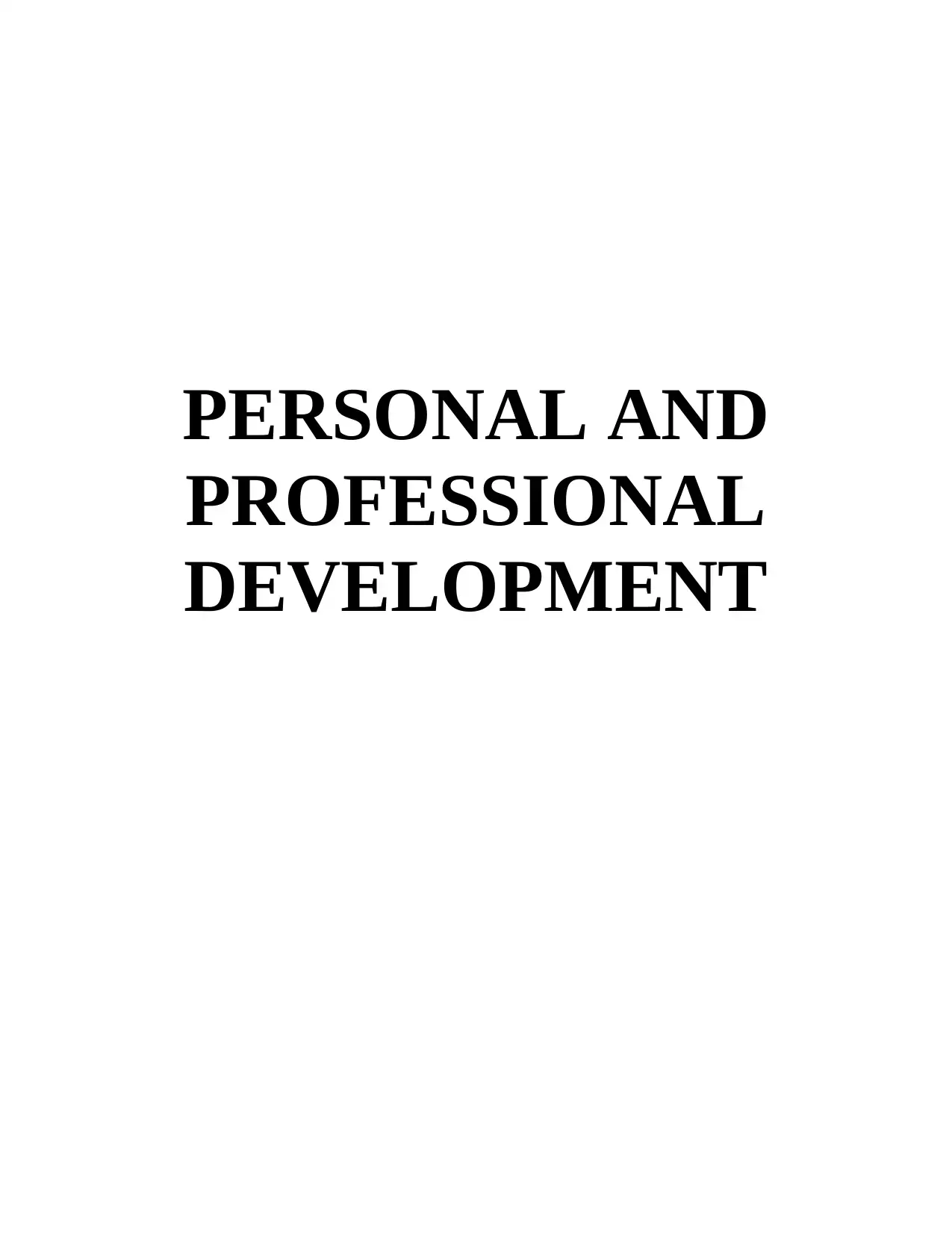
PERSONAL AND
PROFESSIONAL
DEVELOPMENT
PROFESSIONAL
DEVELOPMENT
Paraphrase This Document
Need a fresh take? Get an instant paraphrase of this document with our AI Paraphraser
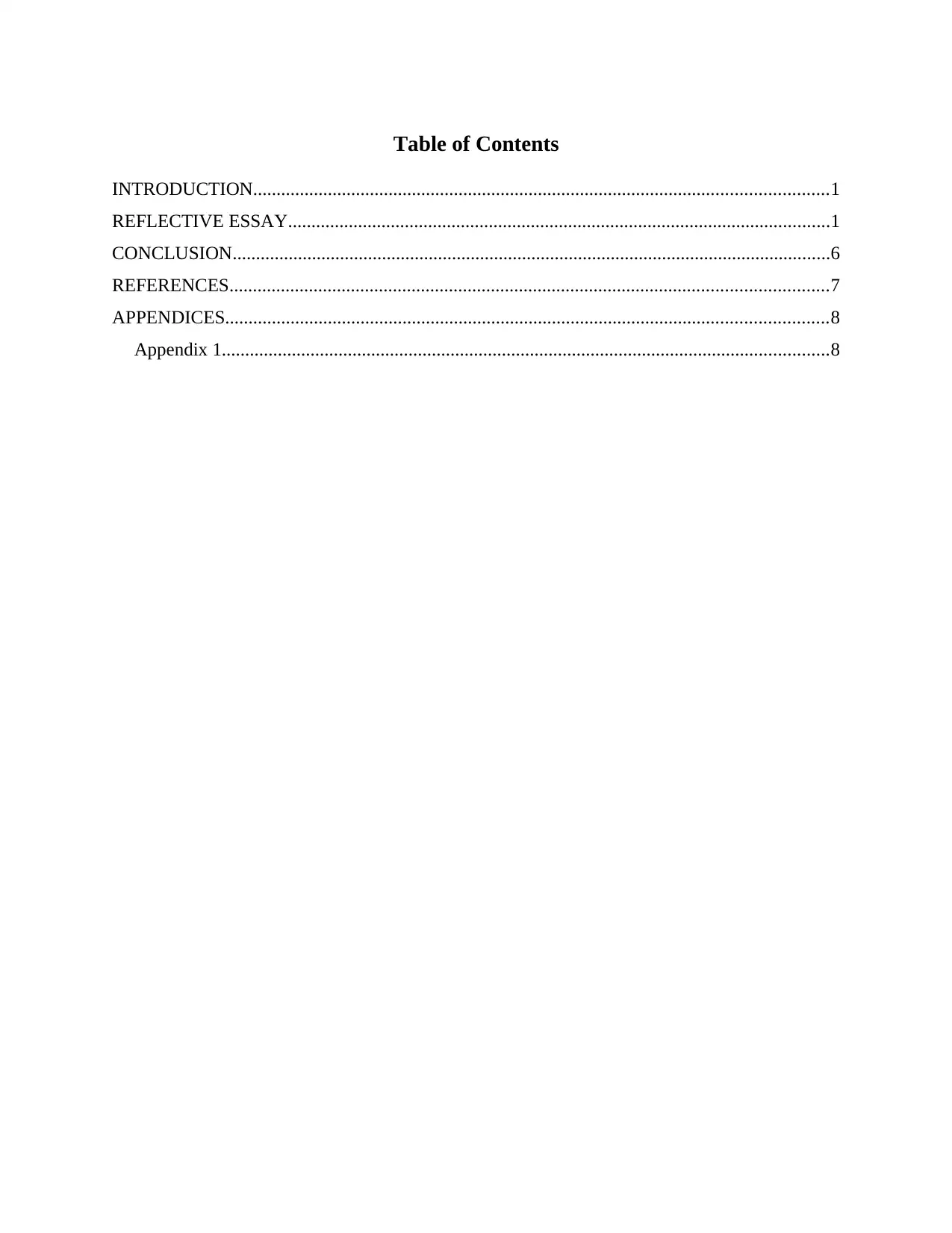
Table of Contents
INTRODUCTION...........................................................................................................................1
REFLECTIVE ESSAY....................................................................................................................1
CONCLUSION................................................................................................................................6
REFERENCES................................................................................................................................7
APPENDICES.................................................................................................................................8
Appendix 1..................................................................................................................................8
INTRODUCTION...........................................................................................................................1
REFLECTIVE ESSAY....................................................................................................................1
CONCLUSION................................................................................................................................6
REFERENCES................................................................................................................................7
APPENDICES.................................................................................................................................8
Appendix 1..................................................................................................................................8
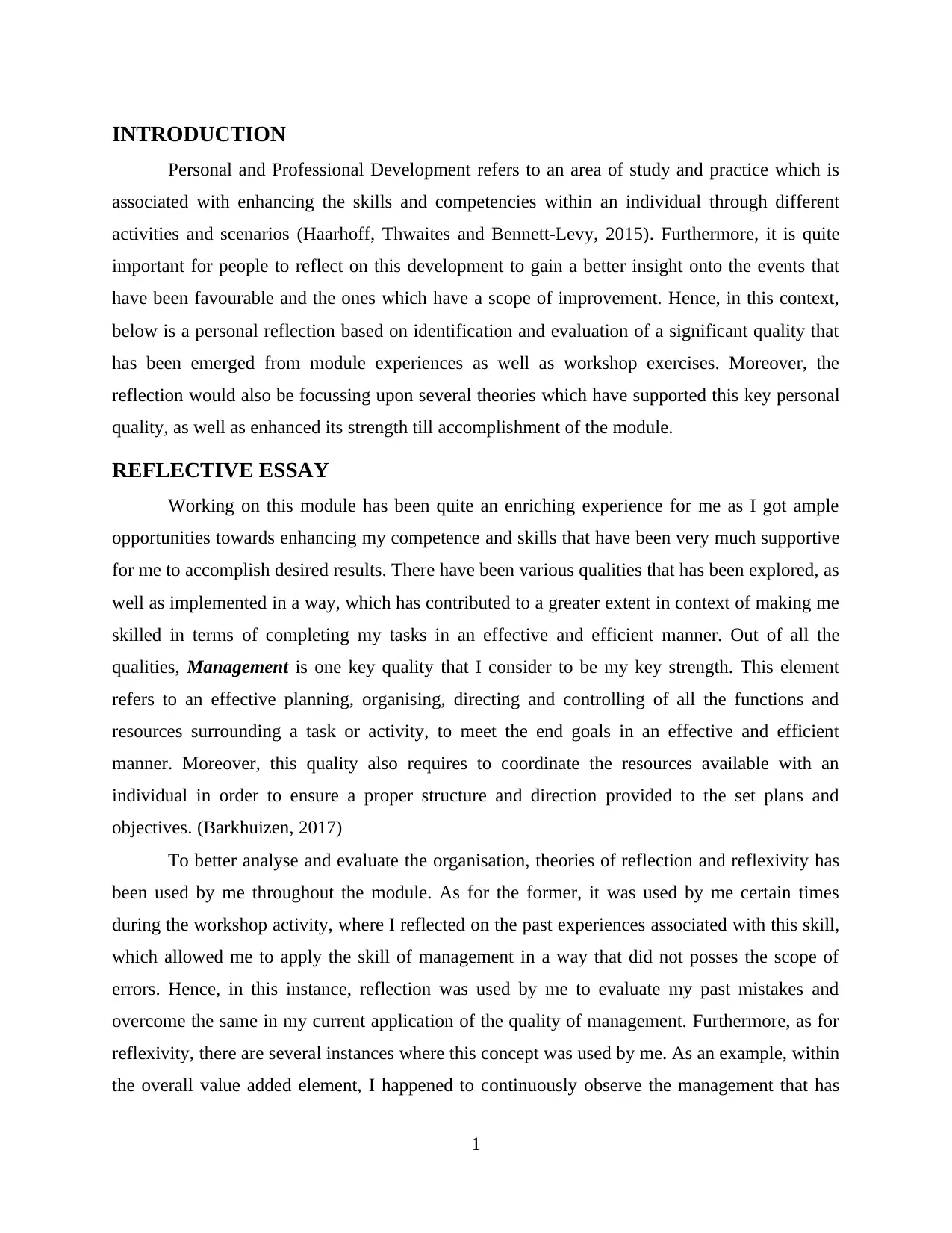
INTRODUCTION
Personal and Professional Development refers to an area of study and practice which is
associated with enhancing the skills and competencies within an individual through different
activities and scenarios (Haarhoff, Thwaites and Bennett‐Levy, 2015). Furthermore, it is quite
important for people to reflect on this development to gain a better insight onto the events that
have been favourable and the ones which have a scope of improvement. Hence, in this context,
below is a personal reflection based on identification and evaluation of a significant quality that
has been emerged from module experiences as well as workshop exercises. Moreover, the
reflection would also be focussing upon several theories which have supported this key personal
quality, as well as enhanced its strength till accomplishment of the module.
REFLECTIVE ESSAY
Working on this module has been quite an enriching experience for me as I got ample
opportunities towards enhancing my competence and skills that have been very much supportive
for me to accomplish desired results. There have been various qualities that has been explored, as
well as implemented in a way, which has contributed to a greater extent in context of making me
skilled in terms of completing my tasks in an effective and efficient manner. Out of all the
qualities, Management is one key quality that I consider to be my key strength. This element
refers to an effective planning, organising, directing and controlling of all the functions and
resources surrounding a task or activity, to meet the end goals in an effective and efficient
manner. Moreover, this quality also requires to coordinate the resources available with an
individual in order to ensure a proper structure and direction provided to the set plans and
objectives. (Barkhuizen, 2017)
To better analyse and evaluate the organisation, theories of reflection and reflexivity has
been used by me throughout the module. As for the former, it was used by me certain times
during the workshop activity, where I reflected on the past experiences associated with this skill,
which allowed me to apply the skill of management in a way that did not posses the scope of
errors. Hence, in this instance, reflection was used by me to evaluate my past mistakes and
overcome the same in my current application of the quality of management. Furthermore, as for
reflexivity, there are several instances where this concept was used by me. As an example, within
the overall value added element, I happened to continuously observe the management that has
1
Personal and Professional Development refers to an area of study and practice which is
associated with enhancing the skills and competencies within an individual through different
activities and scenarios (Haarhoff, Thwaites and Bennett‐Levy, 2015). Furthermore, it is quite
important for people to reflect on this development to gain a better insight onto the events that
have been favourable and the ones which have a scope of improvement. Hence, in this context,
below is a personal reflection based on identification and evaluation of a significant quality that
has been emerged from module experiences as well as workshop exercises. Moreover, the
reflection would also be focussing upon several theories which have supported this key personal
quality, as well as enhanced its strength till accomplishment of the module.
REFLECTIVE ESSAY
Working on this module has been quite an enriching experience for me as I got ample
opportunities towards enhancing my competence and skills that have been very much supportive
for me to accomplish desired results. There have been various qualities that has been explored, as
well as implemented in a way, which has contributed to a greater extent in context of making me
skilled in terms of completing my tasks in an effective and efficient manner. Out of all the
qualities, Management is one key quality that I consider to be my key strength. This element
refers to an effective planning, organising, directing and controlling of all the functions and
resources surrounding a task or activity, to meet the end goals in an effective and efficient
manner. Moreover, this quality also requires to coordinate the resources available with an
individual in order to ensure a proper structure and direction provided to the set plans and
objectives. (Barkhuizen, 2017)
To better analyse and evaluate the organisation, theories of reflection and reflexivity has
been used by me throughout the module. As for the former, it was used by me certain times
during the workshop activity, where I reflected on the past experiences associated with this skill,
which allowed me to apply the skill of management in a way that did not posses the scope of
errors. Hence, in this instance, reflection was used by me to evaluate my past mistakes and
overcome the same in my current application of the quality of management. Furthermore, as for
reflexivity, there are several instances where this concept was used by me. As an example, within
the overall value added element, I happened to continuously observe the management that has
1
⊘ This is a preview!⊘
Do you want full access?
Subscribe today to unlock all pages.

Trusted by 1+ million students worldwide
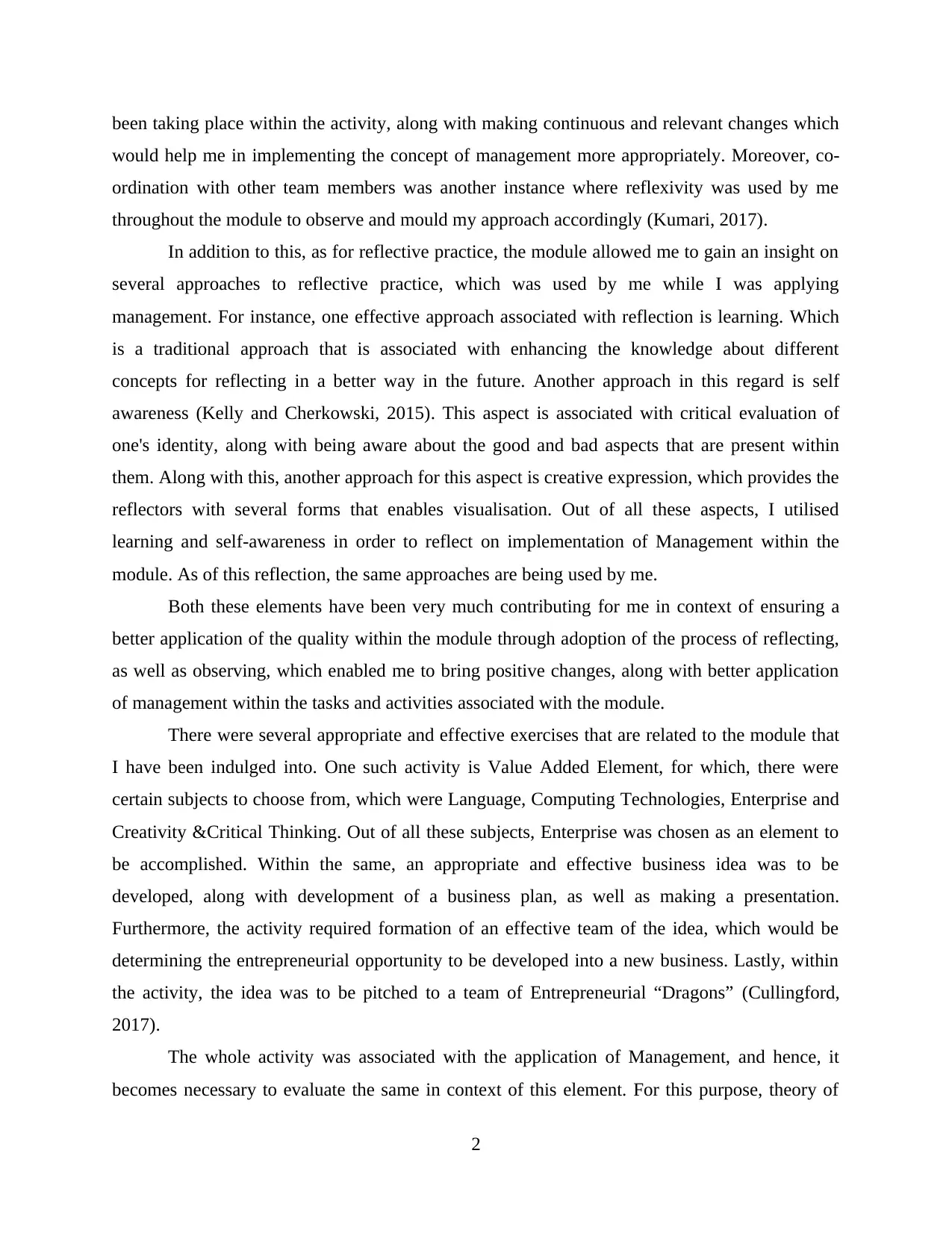
been taking place within the activity, along with making continuous and relevant changes which
would help me in implementing the concept of management more appropriately. Moreover, co-
ordination with other team members was another instance where reflexivity was used by me
throughout the module to observe and mould my approach accordingly (Kumari, 2017).
In addition to this, as for reflective practice, the module allowed me to gain an insight on
several approaches to reflective practice, which was used by me while I was applying
management. For instance, one effective approach associated with reflection is learning. Which
is a traditional approach that is associated with enhancing the knowledge about different
concepts for reflecting in a better way in the future. Another approach in this regard is self
awareness (Kelly and Cherkowski, 2015). This aspect is associated with critical evaluation of
one's identity, along with being aware about the good and bad aspects that are present within
them. Along with this, another approach for this aspect is creative expression, which provides the
reflectors with several forms that enables visualisation. Out of all these aspects, I utilised
learning and self-awareness in order to reflect on implementation of Management within the
module. As of this reflection, the same approaches are being used by me.
Both these elements have been very much contributing for me in context of ensuring a
better application of the quality within the module through adoption of the process of reflecting,
as well as observing, which enabled me to bring positive changes, along with better application
of management within the tasks and activities associated with the module.
There were several appropriate and effective exercises that are related to the module that
I have been indulged into. One such activity is Value Added Element, for which, there were
certain subjects to choose from, which were Language, Computing Technologies, Enterprise and
Creativity &Critical Thinking. Out of all these subjects, Enterprise was chosen as an element to
be accomplished. Within the same, an appropriate and effective business idea was to be
developed, along with development of a business plan, as well as making a presentation.
Furthermore, the activity required formation of an effective team of the idea, which would be
determining the entrepreneurial opportunity to be developed into a new business. Lastly, within
the activity, the idea was to be pitched to a team of Entrepreneurial “Dragons” (Cullingford,
2017).
The whole activity was associated with the application of Management, and hence, it
becomes necessary to evaluate the same in context of this element. For this purpose, theory of
2
would help me in implementing the concept of management more appropriately. Moreover, co-
ordination with other team members was another instance where reflexivity was used by me
throughout the module to observe and mould my approach accordingly (Kumari, 2017).
In addition to this, as for reflective practice, the module allowed me to gain an insight on
several approaches to reflective practice, which was used by me while I was applying
management. For instance, one effective approach associated with reflection is learning. Which
is a traditional approach that is associated with enhancing the knowledge about different
concepts for reflecting in a better way in the future. Another approach in this regard is self
awareness (Kelly and Cherkowski, 2015). This aspect is associated with critical evaluation of
one's identity, along with being aware about the good and bad aspects that are present within
them. Along with this, another approach for this aspect is creative expression, which provides the
reflectors with several forms that enables visualisation. Out of all these aspects, I utilised
learning and self-awareness in order to reflect on implementation of Management within the
module. As of this reflection, the same approaches are being used by me.
Both these elements have been very much contributing for me in context of ensuring a
better application of the quality within the module through adoption of the process of reflecting,
as well as observing, which enabled me to bring positive changes, along with better application
of management within the tasks and activities associated with the module.
There were several appropriate and effective exercises that are related to the module that
I have been indulged into. One such activity is Value Added Element, for which, there were
certain subjects to choose from, which were Language, Computing Technologies, Enterprise and
Creativity &Critical Thinking. Out of all these subjects, Enterprise was chosen as an element to
be accomplished. Within the same, an appropriate and effective business idea was to be
developed, along with development of a business plan, as well as making a presentation.
Furthermore, the activity required formation of an effective team of the idea, which would be
determining the entrepreneurial opportunity to be developed into a new business. Lastly, within
the activity, the idea was to be pitched to a team of Entrepreneurial “Dragons” (Cullingford,
2017).
The whole activity was associated with the application of Management, and hence, it
becomes necessary to evaluate the same in context of this element. For this purpose, theory of
2
Paraphrase This Document
Need a fresh take? Get an instant paraphrase of this document with our AI Paraphraser
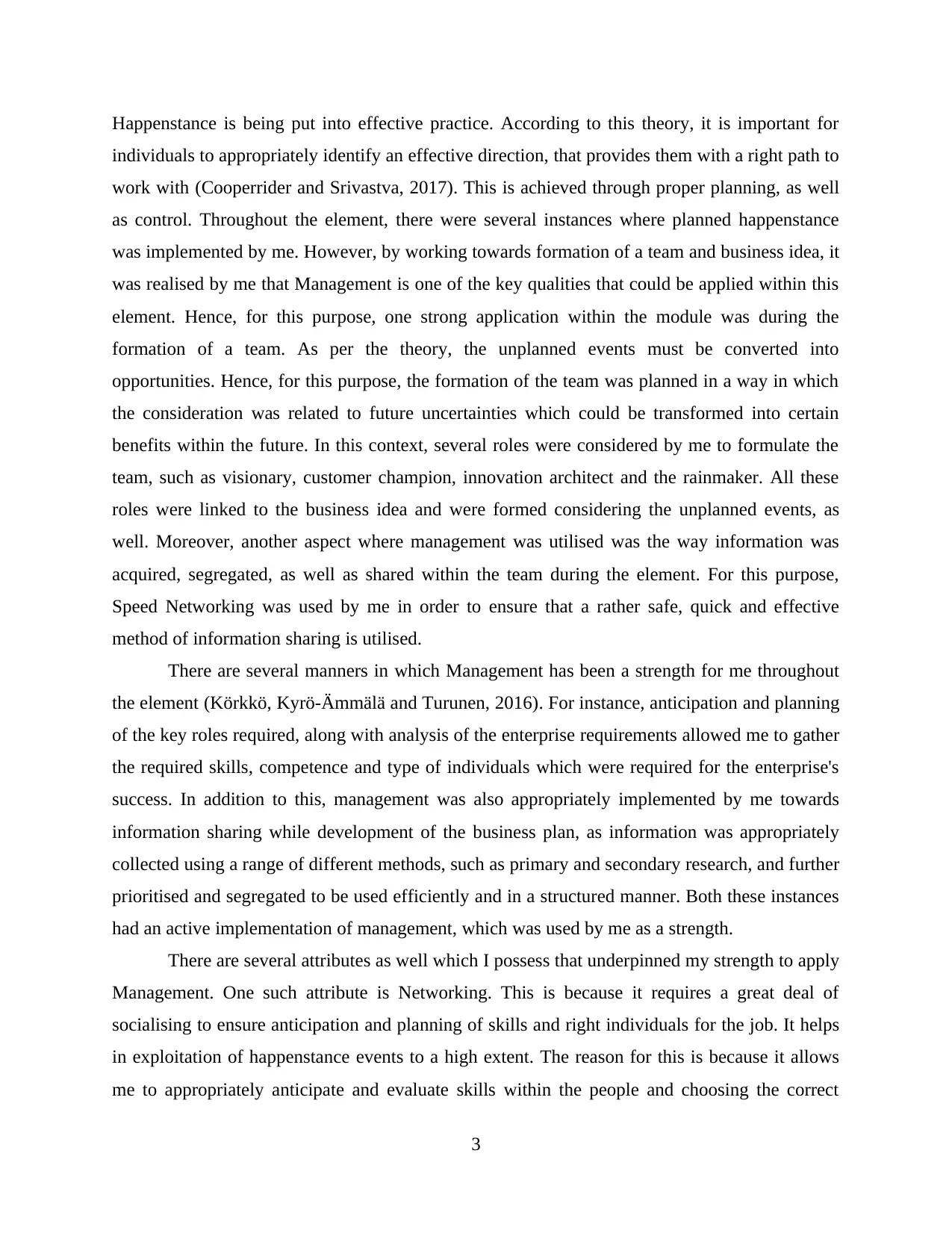
Happenstance is being put into effective practice. According to this theory, it is important for
individuals to appropriately identify an effective direction, that provides them with a right path to
work with (Cooperrider and Srivastva, 2017). This is achieved through proper planning, as well
as control. Throughout the element, there were several instances where planned happenstance
was implemented by me. However, by working towards formation of a team and business idea, it
was realised by me that Management is one of the key qualities that could be applied within this
element. Hence, for this purpose, one strong application within the module was during the
formation of a team. As per the theory, the unplanned events must be converted into
opportunities. Hence, for this purpose, the formation of the team was planned in a way in which
the consideration was related to future uncertainties which could be transformed into certain
benefits within the future. In this context, several roles were considered by me to formulate the
team, such as visionary, customer champion, innovation architect and the rainmaker. All these
roles were linked to the business idea and were formed considering the unplanned events, as
well. Moreover, another aspect where management was utilised was the way information was
acquired, segregated, as well as shared within the team during the element. For this purpose,
Speed Networking was used by me in order to ensure that a rather safe, quick and effective
method of information sharing is utilised.
There are several manners in which Management has been a strength for me throughout
the element (Körkkö, Kyrö-Ämmälä and Turunen, 2016). For instance, anticipation and planning
of the key roles required, along with analysis of the enterprise requirements allowed me to gather
the required skills, competence and type of individuals which were required for the enterprise's
success. In addition to this, management was also appropriately implemented by me towards
information sharing while development of the business plan, as information was appropriately
collected using a range of different methods, such as primary and secondary research, and further
prioritised and segregated to be used efficiently and in a structured manner. Both these instances
had an active implementation of management, which was used by me as a strength.
There are several attributes as well which I possess that underpinned my strength to apply
Management. One such attribute is Networking. This is because it requires a great deal of
socialising to ensure anticipation and planning of skills and right individuals for the job. It helps
in exploitation of happenstance events to a high extent. The reason for this is because it allows
me to appropriately anticipate and evaluate skills within the people and choosing the correct
3
individuals to appropriately identify an effective direction, that provides them with a right path to
work with (Cooperrider and Srivastva, 2017). This is achieved through proper planning, as well
as control. Throughout the element, there were several instances where planned happenstance
was implemented by me. However, by working towards formation of a team and business idea, it
was realised by me that Management is one of the key qualities that could be applied within this
element. Hence, for this purpose, one strong application within the module was during the
formation of a team. As per the theory, the unplanned events must be converted into
opportunities. Hence, for this purpose, the formation of the team was planned in a way in which
the consideration was related to future uncertainties which could be transformed into certain
benefits within the future. In this context, several roles were considered by me to formulate the
team, such as visionary, customer champion, innovation architect and the rainmaker. All these
roles were linked to the business idea and were formed considering the unplanned events, as
well. Moreover, another aspect where management was utilised was the way information was
acquired, segregated, as well as shared within the team during the element. For this purpose,
Speed Networking was used by me in order to ensure that a rather safe, quick and effective
method of information sharing is utilised.
There are several manners in which Management has been a strength for me throughout
the element (Körkkö, Kyrö-Ämmälä and Turunen, 2016). For instance, anticipation and planning
of the key roles required, along with analysis of the enterprise requirements allowed me to gather
the required skills, competence and type of individuals which were required for the enterprise's
success. In addition to this, management was also appropriately implemented by me towards
information sharing while development of the business plan, as information was appropriately
collected using a range of different methods, such as primary and secondary research, and further
prioritised and segregated to be used efficiently and in a structured manner. Both these instances
had an active implementation of management, which was used by me as a strength.
There are several attributes as well which I possess that underpinned my strength to apply
Management. One such attribute is Networking. This is because it requires a great deal of
socialising to ensure anticipation and planning of skills and right individuals for the job. It helps
in exploitation of happenstance events to a high extent. The reason for this is because it allows
me to appropriately anticipate and evaluate skills within the people and choosing the correct
3
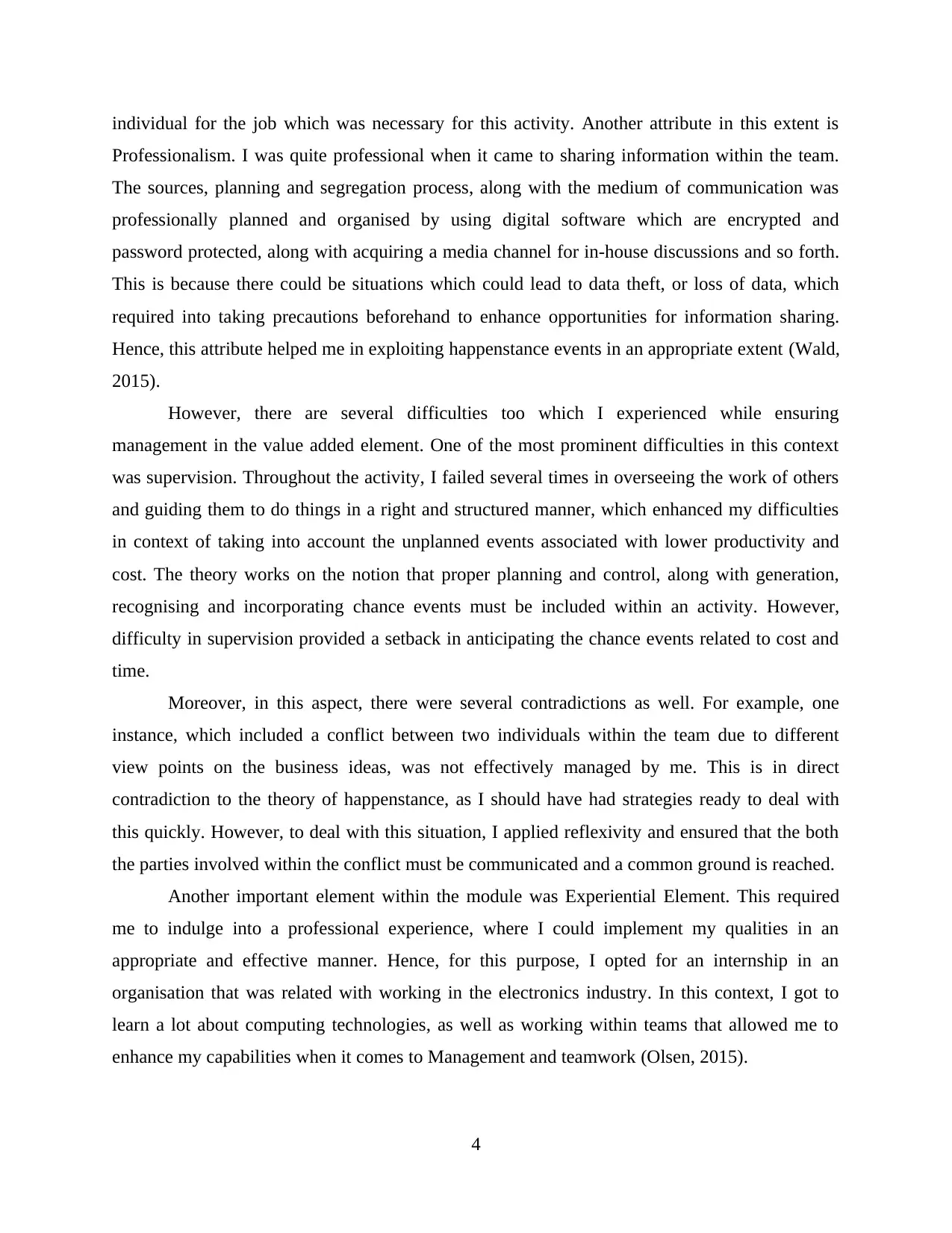
individual for the job which was necessary for this activity. Another attribute in this extent is
Professionalism. I was quite professional when it came to sharing information within the team.
The sources, planning and segregation process, along with the medium of communication was
professionally planned and organised by using digital software which are encrypted and
password protected, along with acquiring a media channel for in-house discussions and so forth.
This is because there could be situations which could lead to data theft, or loss of data, which
required into taking precautions beforehand to enhance opportunities for information sharing.
Hence, this attribute helped me in exploiting happenstance events in an appropriate extent (Wald,
2015).
However, there are several difficulties too which I experienced while ensuring
management in the value added element. One of the most prominent difficulties in this context
was supervision. Throughout the activity, I failed several times in overseeing the work of others
and guiding them to do things in a right and structured manner, which enhanced my difficulties
in context of taking into account the unplanned events associated with lower productivity and
cost. The theory works on the notion that proper planning and control, along with generation,
recognising and incorporating chance events must be included within an activity. However,
difficulty in supervision provided a setback in anticipating the chance events related to cost and
time.
Moreover, in this aspect, there were several contradictions as well. For example, one
instance, which included a conflict between two individuals within the team due to different
view points on the business ideas, was not effectively managed by me. This is in direct
contradiction to the theory of happenstance, as I should have had strategies ready to deal with
this quickly. However, to deal with this situation, I applied reflexivity and ensured that the both
the parties involved within the conflict must be communicated and a common ground is reached.
Another important element within the module was Experiential Element. This required
me to indulge into a professional experience, where I could implement my qualities in an
appropriate and effective manner. Hence, for this purpose, I opted for an internship in an
organisation that was related with working in the electronics industry. In this context, I got to
learn a lot about computing technologies, as well as working within teams that allowed me to
enhance my capabilities when it comes to Management and teamwork (Olsen, 2015).
4
Professionalism. I was quite professional when it came to sharing information within the team.
The sources, planning and segregation process, along with the medium of communication was
professionally planned and organised by using digital software which are encrypted and
password protected, along with acquiring a media channel for in-house discussions and so forth.
This is because there could be situations which could lead to data theft, or loss of data, which
required into taking precautions beforehand to enhance opportunities for information sharing.
Hence, this attribute helped me in exploiting happenstance events in an appropriate extent (Wald,
2015).
However, there are several difficulties too which I experienced while ensuring
management in the value added element. One of the most prominent difficulties in this context
was supervision. Throughout the activity, I failed several times in overseeing the work of others
and guiding them to do things in a right and structured manner, which enhanced my difficulties
in context of taking into account the unplanned events associated with lower productivity and
cost. The theory works on the notion that proper planning and control, along with generation,
recognising and incorporating chance events must be included within an activity. However,
difficulty in supervision provided a setback in anticipating the chance events related to cost and
time.
Moreover, in this aspect, there were several contradictions as well. For example, one
instance, which included a conflict between two individuals within the team due to different
view points on the business ideas, was not effectively managed by me. This is in direct
contradiction to the theory of happenstance, as I should have had strategies ready to deal with
this quickly. However, to deal with this situation, I applied reflexivity and ensured that the both
the parties involved within the conflict must be communicated and a common ground is reached.
Another important element within the module was Experiential Element. This required
me to indulge into a professional experience, where I could implement my qualities in an
appropriate and effective manner. Hence, for this purpose, I opted for an internship in an
organisation that was related with working in the electronics industry. In this context, I got to
learn a lot about computing technologies, as well as working within teams that allowed me to
enhance my capabilities when it comes to Management and teamwork (Olsen, 2015).
4
⊘ This is a preview!⊘
Do you want full access?
Subscribe today to unlock all pages.

Trusted by 1+ million students worldwide
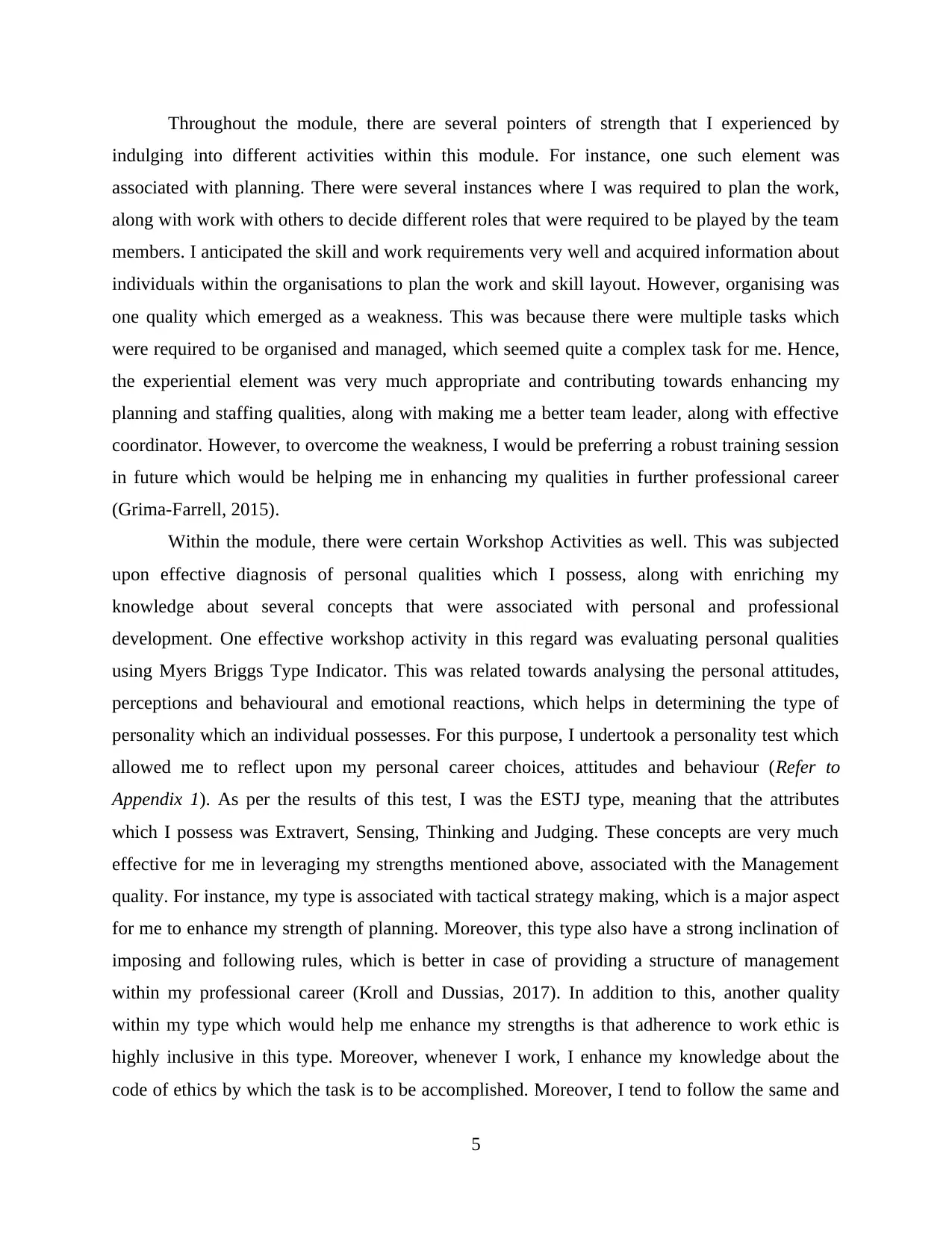
Throughout the module, there are several pointers of strength that I experienced by
indulging into different activities within this module. For instance, one such element was
associated with planning. There were several instances where I was required to plan the work,
along with work with others to decide different roles that were required to be played by the team
members. I anticipated the skill and work requirements very well and acquired information about
individuals within the organisations to plan the work and skill layout. However, organising was
one quality which emerged as a weakness. This was because there were multiple tasks which
were required to be organised and managed, which seemed quite a complex task for me. Hence,
the experiential element was very much appropriate and contributing towards enhancing my
planning and staffing qualities, along with making me a better team leader, along with effective
coordinator. However, to overcome the weakness, I would be preferring a robust training session
in future which would be helping me in enhancing my qualities in further professional career
(Grima-Farrell, 2015).
Within the module, there were certain Workshop Activities as well. This was subjected
upon effective diagnosis of personal qualities which I possess, along with enriching my
knowledge about several concepts that were associated with personal and professional
development. One effective workshop activity in this regard was evaluating personal qualities
using Myers Briggs Type Indicator. This was related towards analysing the personal attitudes,
perceptions and behavioural and emotional reactions, which helps in determining the type of
personality which an individual possesses. For this purpose, I undertook a personality test which
allowed me to reflect upon my personal career choices, attitudes and behaviour (Refer to
Appendix 1). As per the results of this test, I was the ESTJ type, meaning that the attributes
which I possess was Extravert, Sensing, Thinking and Judging. These concepts are very much
effective for me in leveraging my strengths mentioned above, associated with the Management
quality. For instance, my type is associated with tactical strategy making, which is a major aspect
for me to enhance my strength of planning. Moreover, this type also have a strong inclination of
imposing and following rules, which is better in case of providing a structure of management
within my professional career (Kroll and Dussias, 2017). In addition to this, another quality
within my type which would help me enhance my strengths is that adherence to work ethic is
highly inclusive in this type. Moreover, whenever I work, I enhance my knowledge about the
code of ethics by which the task is to be accomplished. Moreover, I tend to follow the same and
5
indulging into different activities within this module. For instance, one such element was
associated with planning. There were several instances where I was required to plan the work,
along with work with others to decide different roles that were required to be played by the team
members. I anticipated the skill and work requirements very well and acquired information about
individuals within the organisations to plan the work and skill layout. However, organising was
one quality which emerged as a weakness. This was because there were multiple tasks which
were required to be organised and managed, which seemed quite a complex task for me. Hence,
the experiential element was very much appropriate and contributing towards enhancing my
planning and staffing qualities, along with making me a better team leader, along with effective
coordinator. However, to overcome the weakness, I would be preferring a robust training session
in future which would be helping me in enhancing my qualities in further professional career
(Grima-Farrell, 2015).
Within the module, there were certain Workshop Activities as well. This was subjected
upon effective diagnosis of personal qualities which I possess, along with enriching my
knowledge about several concepts that were associated with personal and professional
development. One effective workshop activity in this regard was evaluating personal qualities
using Myers Briggs Type Indicator. This was related towards analysing the personal attitudes,
perceptions and behavioural and emotional reactions, which helps in determining the type of
personality which an individual possesses. For this purpose, I undertook a personality test which
allowed me to reflect upon my personal career choices, attitudes and behaviour (Refer to
Appendix 1). As per the results of this test, I was the ESTJ type, meaning that the attributes
which I possess was Extravert, Sensing, Thinking and Judging. These concepts are very much
effective for me in leveraging my strengths mentioned above, associated with the Management
quality. For instance, my type is associated with tactical strategy making, which is a major aspect
for me to enhance my strength of planning. Moreover, this type also have a strong inclination of
imposing and following rules, which is better in case of providing a structure of management
within my professional career (Kroll and Dussias, 2017). In addition to this, another quality
within my type which would help me enhance my strengths is that adherence to work ethic is
highly inclusive in this type. Moreover, whenever I work, I enhance my knowledge about the
code of ethics by which the task is to be accomplished. Moreover, I tend to follow the same and
5
Paraphrase This Document
Need a fresh take? Get an instant paraphrase of this document with our AI Paraphraser
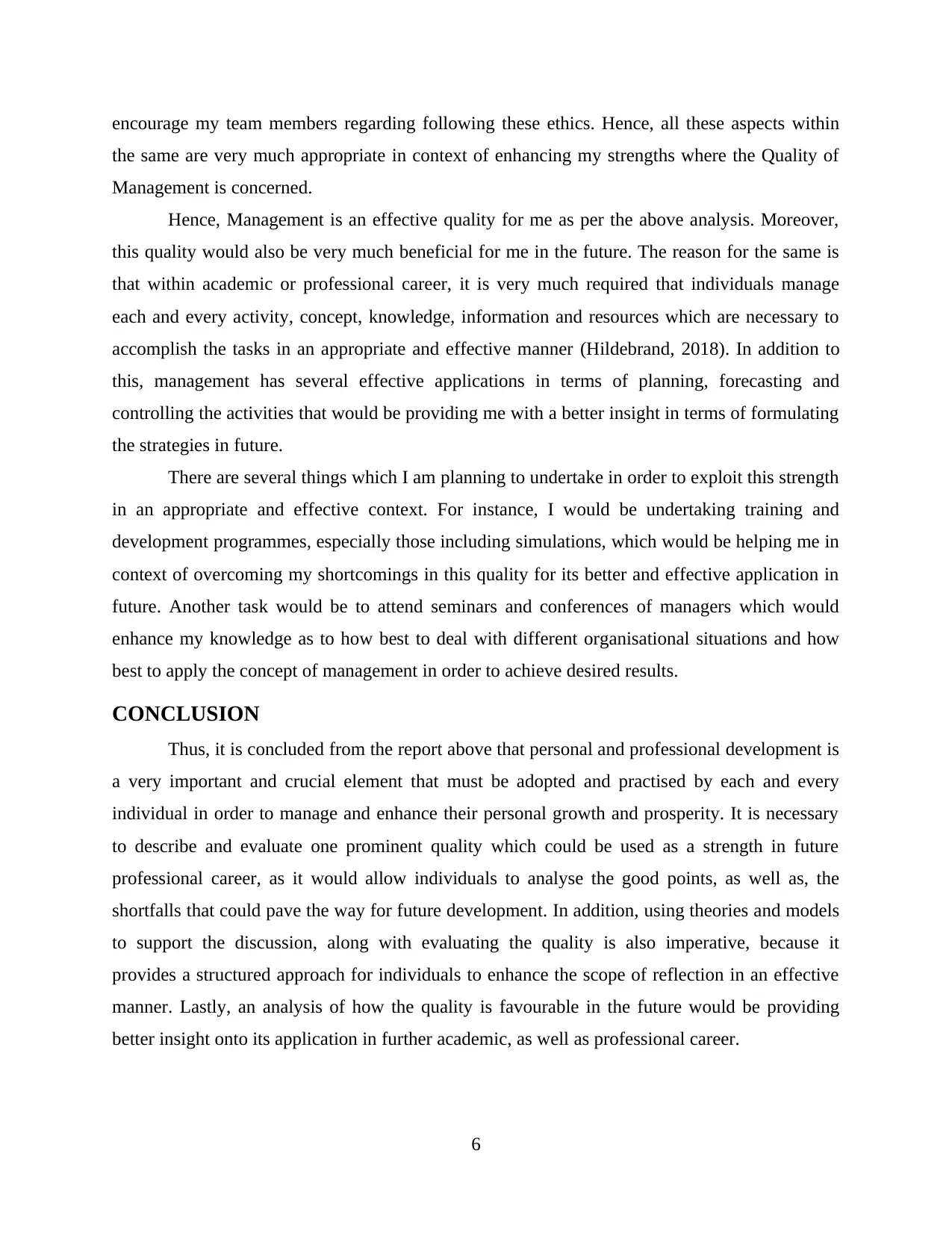
encourage my team members regarding following these ethics. Hence, all these aspects within
the same are very much appropriate in context of enhancing my strengths where the Quality of
Management is concerned.
Hence, Management is an effective quality for me as per the above analysis. Moreover,
this quality would also be very much beneficial for me in the future. The reason for the same is
that within academic or professional career, it is very much required that individuals manage
each and every activity, concept, knowledge, information and resources which are necessary to
accomplish the tasks in an appropriate and effective manner (Hildebrand, 2018). In addition to
this, management has several effective applications in terms of planning, forecasting and
controlling the activities that would be providing me with a better insight in terms of formulating
the strategies in future.
There are several things which I am planning to undertake in order to exploit this strength
in an appropriate and effective context. For instance, I would be undertaking training and
development programmes, especially those including simulations, which would be helping me in
context of overcoming my shortcomings in this quality for its better and effective application in
future. Another task would be to attend seminars and conferences of managers which would
enhance my knowledge as to how best to deal with different organisational situations and how
best to apply the concept of management in order to achieve desired results.
CONCLUSION
Thus, it is concluded from the report above that personal and professional development is
a very important and crucial element that must be adopted and practised by each and every
individual in order to manage and enhance their personal growth and prosperity. It is necessary
to describe and evaluate one prominent quality which could be used as a strength in future
professional career, as it would allow individuals to analyse the good points, as well as, the
shortfalls that could pave the way for future development. In addition, using theories and models
to support the discussion, along with evaluating the quality is also imperative, because it
provides a structured approach for individuals to enhance the scope of reflection in an effective
manner. Lastly, an analysis of how the quality is favourable in the future would be providing
better insight onto its application in further academic, as well as professional career.
6
the same are very much appropriate in context of enhancing my strengths where the Quality of
Management is concerned.
Hence, Management is an effective quality for me as per the above analysis. Moreover,
this quality would also be very much beneficial for me in the future. The reason for the same is
that within academic or professional career, it is very much required that individuals manage
each and every activity, concept, knowledge, information and resources which are necessary to
accomplish the tasks in an appropriate and effective manner (Hildebrand, 2018). In addition to
this, management has several effective applications in terms of planning, forecasting and
controlling the activities that would be providing me with a better insight in terms of formulating
the strategies in future.
There are several things which I am planning to undertake in order to exploit this strength
in an appropriate and effective context. For instance, I would be undertaking training and
development programmes, especially those including simulations, which would be helping me in
context of overcoming my shortcomings in this quality for its better and effective application in
future. Another task would be to attend seminars and conferences of managers which would
enhance my knowledge as to how best to deal with different organisational situations and how
best to apply the concept of management in order to achieve desired results.
CONCLUSION
Thus, it is concluded from the report above that personal and professional development is
a very important and crucial element that must be adopted and practised by each and every
individual in order to manage and enhance their personal growth and prosperity. It is necessary
to describe and evaluate one prominent quality which could be used as a strength in future
professional career, as it would allow individuals to analyse the good points, as well as, the
shortfalls that could pave the way for future development. In addition, using theories and models
to support the discussion, along with evaluating the quality is also imperative, because it
provides a structured approach for individuals to enhance the scope of reflection in an effective
manner. Lastly, an analysis of how the quality is favourable in the future would be providing
better insight onto its application in further academic, as well as professional career.
6
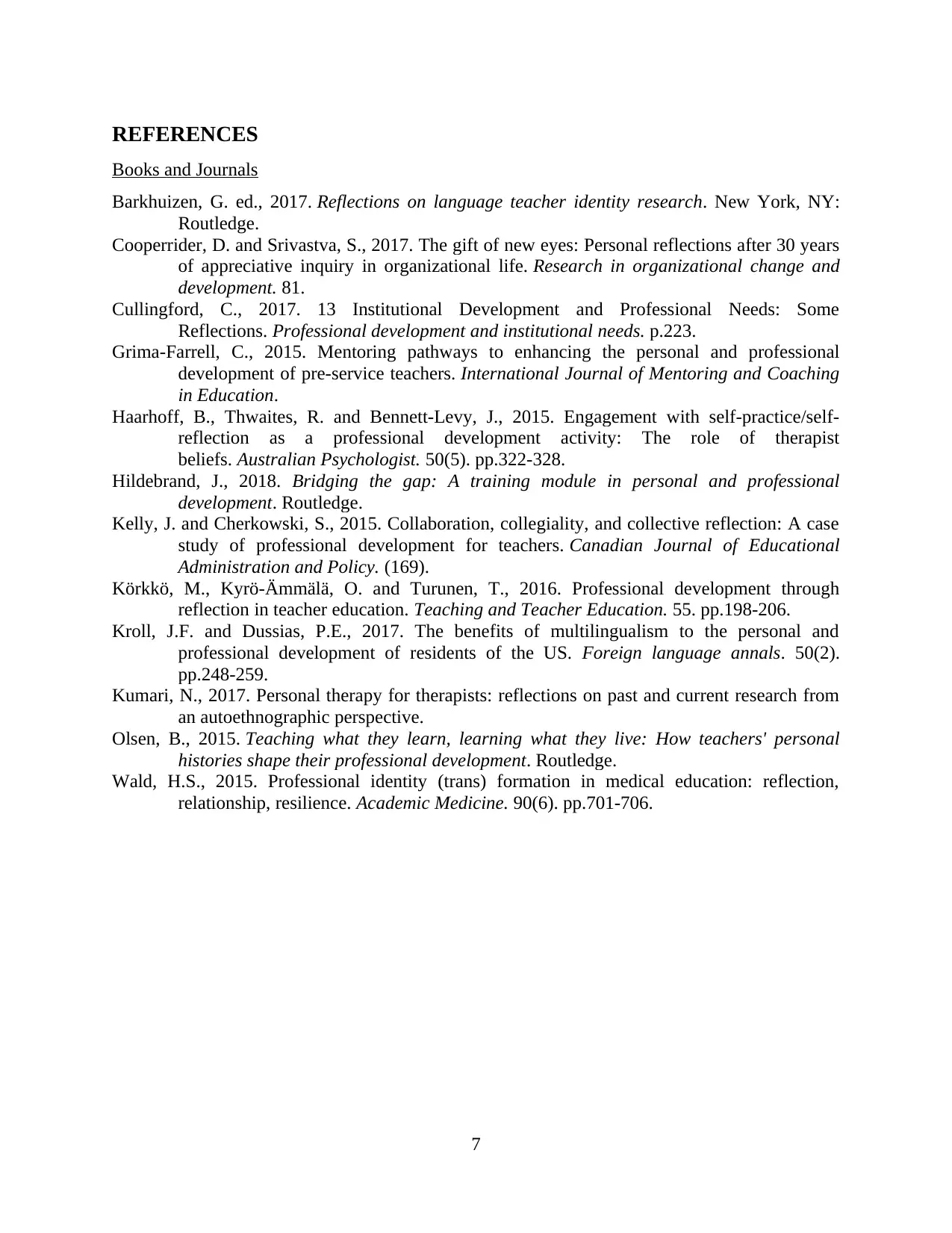
REFERENCES
Books and Journals
Barkhuizen, G. ed., 2017. Reflections on language teacher identity research. New York, NY:
Routledge.
Cooperrider, D. and Srivastva, S., 2017. The gift of new eyes: Personal reflections after 30 years
of appreciative inquiry in organizational life. Research in organizational change and
development. 81.
Cullingford, C., 2017. 13 Institutional Development and Professional Needs: Some
Reflections. Professional development and institutional needs. p.223.
Grima-Farrell, C., 2015. Mentoring pathways to enhancing the personal and professional
development of pre-service teachers. International Journal of Mentoring and Coaching
in Education.
Haarhoff, B., Thwaites, R. and Bennett‐Levy, J., 2015. Engagement with self‐practice/self‐
reflection as a professional development activity: The role of therapist
beliefs. Australian Psychologist. 50(5). pp.322-328.
Hildebrand, J., 2018. Bridging the gap: A training module in personal and professional
development. Routledge.
Kelly, J. and Cherkowski, S., 2015. Collaboration, collegiality, and collective reflection: A case
study of professional development for teachers. Canadian Journal of Educational
Administration and Policy. (169).
Körkkö, M., Kyrö-Ämmälä, O. and Turunen, T., 2016. Professional development through
reflection in teacher education. Teaching and Teacher Education. 55. pp.198-206.
Kroll, J.F. and Dussias, P.E., 2017. The benefits of multilingualism to the personal and
professional development of residents of the US. Foreign language annals. 50(2).
pp.248-259.
Kumari, N., 2017. Personal therapy for therapists: reflections on past and current research from
an autoethnographic perspective.
Olsen, B., 2015. Teaching what they learn, learning what they live: How teachers' personal
histories shape their professional development. Routledge.
Wald, H.S., 2015. Professional identity (trans) formation in medical education: reflection,
relationship, resilience. Academic Medicine. 90(6). pp.701-706.
7
Books and Journals
Barkhuizen, G. ed., 2017. Reflections on language teacher identity research. New York, NY:
Routledge.
Cooperrider, D. and Srivastva, S., 2017. The gift of new eyes: Personal reflections after 30 years
of appreciative inquiry in organizational life. Research in organizational change and
development. 81.
Cullingford, C., 2017. 13 Institutional Development and Professional Needs: Some
Reflections. Professional development and institutional needs. p.223.
Grima-Farrell, C., 2015. Mentoring pathways to enhancing the personal and professional
development of pre-service teachers. International Journal of Mentoring and Coaching
in Education.
Haarhoff, B., Thwaites, R. and Bennett‐Levy, J., 2015. Engagement with self‐practice/self‐
reflection as a professional development activity: The role of therapist
beliefs. Australian Psychologist. 50(5). pp.322-328.
Hildebrand, J., 2018. Bridging the gap: A training module in personal and professional
development. Routledge.
Kelly, J. and Cherkowski, S., 2015. Collaboration, collegiality, and collective reflection: A case
study of professional development for teachers. Canadian Journal of Educational
Administration and Policy. (169).
Körkkö, M., Kyrö-Ämmälä, O. and Turunen, T., 2016. Professional development through
reflection in teacher education. Teaching and Teacher Education. 55. pp.198-206.
Kroll, J.F. and Dussias, P.E., 2017. The benefits of multilingualism to the personal and
professional development of residents of the US. Foreign language annals. 50(2).
pp.248-259.
Kumari, N., 2017. Personal therapy for therapists: reflections on past and current research from
an autoethnographic perspective.
Olsen, B., 2015. Teaching what they learn, learning what they live: How teachers' personal
histories shape their professional development. Routledge.
Wald, H.S., 2015. Professional identity (trans) formation in medical education: reflection,
relationship, resilience. Academic Medicine. 90(6). pp.701-706.
7
⊘ This is a preview!⊘
Do you want full access?
Subscribe today to unlock all pages.

Trusted by 1+ million students worldwide
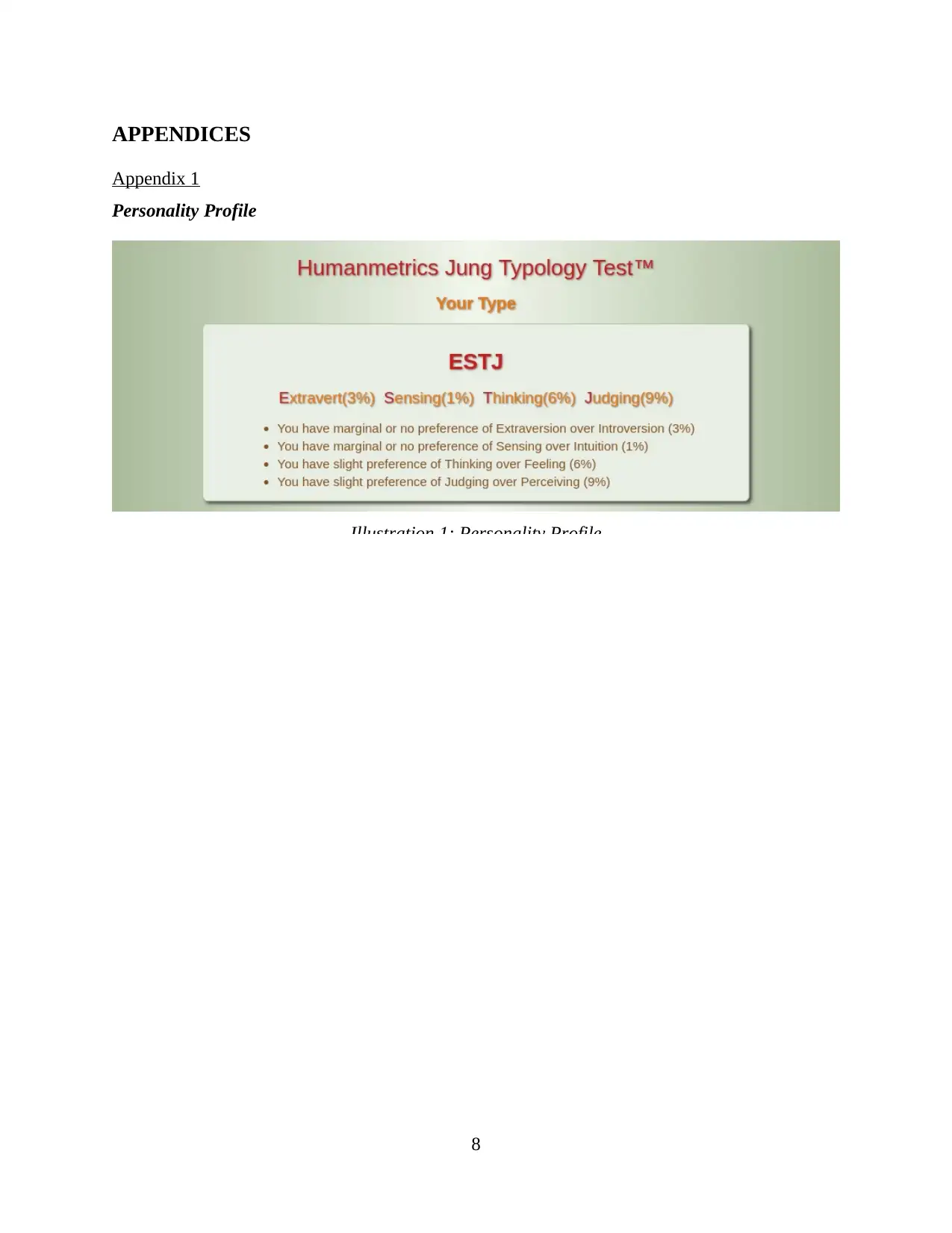
APPENDICES
Appendix 1
Personality Profile
Illustration 1: Personality Profile
8
Appendix 1
Personality Profile
Illustration 1: Personality Profile
8
1 out of 10
Related Documents
Your All-in-One AI-Powered Toolkit for Academic Success.
+13062052269
info@desklib.com
Available 24*7 on WhatsApp / Email
![[object Object]](/_next/static/media/star-bottom.7253800d.svg)
Unlock your academic potential
Copyright © 2020–2026 A2Z Services. All Rights Reserved. Developed and managed by ZUCOL.





